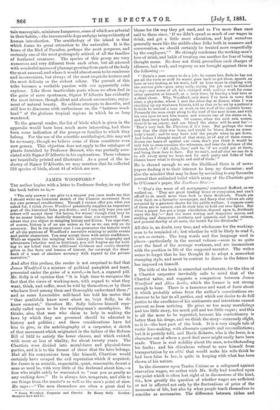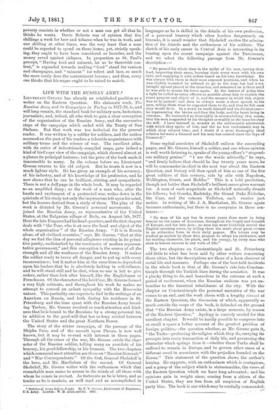JAMES WOODFORD.*
THE author begins with a letter to Professor Seeley, to say that the book before us is,— " The only answer I can give to a request you once made me that I should write an historical sketch of the Chartist movement from my own personal recollections. Though I cannot offer you what you asked for, I think James Woodford practically supplies an important part of the historical links you desire ; and I can only hope you and others will accept them for better, for worse,' though they may be ky no means better, but decidedly worse than you expected. I am aware that you object to mingling history and fiction. You urge that, of course, history is of no use unless so far as we can rely on its accuracy. But in the present case I can guarantee the historic truth of all the portions of Woodford's narrative relating to public events and public characters. You may accept them with entire confidence. While as regards the mingling with history, private biography and adventures (whether real or fictitious), you will forgive me for hold- ing to my belief that the additional vividness and reality thereby given to the facts and lessons of history, far outweigh the draw- back of a want of absolute accuracy with regard to the private narrative."
And after this preface, the reader is not surprised to find that
James Woodford is a mixture of political pamphlet and tract, presented under the guise of a novel,—in fact, a sugared pill.
Mr. Solly is of opinion that " it is high time to recognise the fact that the views of working-men, with regard to what they want, think, and suffer, must be told by themselves, or by those
who have lived among them and thoroughly understand them ;" and as some Lancashire mill-hand has told his mates that
4` thee gentlefolk knew nowt aboot us, 'cept Solly, he do knew summnt," therefore Mr. Solly believes himself espe- cially called upon to be the working-man's mouthpiece. He
thinks, also, that men who claim to help in making the laws by which they are governed should be educated in history and politics ; and these considerations have led him to give, in the autobiography of a carpenter, a sketch of that movement which originated in the failure of the Reform Bill of 1832 to satisfy the lower classes, and which existed, with more or less of vitality, for about twenty years. The Chartists were divided into moral-force and physical-force parties, and it is to the former of these that the hero belongs. Had all his companions been like himself, Chartism would certainly have escaped the evil reputation which it acquired; for James is as amiable, respectable, quiet, reasonable, decent a man as need be, with very little of the firebrand about him,—a lion who might safely be warranted to " roar you as gently as any sucking dove." He is always fair, temperate, and able to see things from the master's as well as the men's point of view. He says :—" The men themselves are often a great deal to
• James Woodford, Carpenter and Chartist. By Henry Holly. London : dampson Low and Co.
blame for the way they get used, and as I've more than once said to them since, ' If we didn't spend so much of our wages in drink, and got a little more education, and kept ourselves generally more like the middle-class folks both in manners and conversation, we should certainly be treated more respectfully by the employers.' " He strongly condemns the working-men's love of drink, and habit of treating one another for fear of being thought mean. He does not think groundless such charges of idleness, bad work, and roguery as are brought against them in the following :-
" Here's a man conies to do a job; be comes late, finds he has not got all the tools or stuff he wants, goes back to get them, spends an hour or two looking at his work, half an hour more in chatting with the servant-girls—goes away early, saying the job can't be finished to-day—and worst of all, he's charged with making work for some other operative or himself, at a later time, by leaving a leak here or a chink there. Why, Woodford, only since I've been in town this time, a physician, whom I met the other day at dinner, when I was cracking up my workmen friends, told us that as he sat by a patient's bedside he noticed a man at work on the roof of the opposite house. Presently the man crept along to the roof of the next house, and with his own eyes ho saw him loosen and remove one of the slates on it, and then creep back again. Of course, when the next rain comes, there'll be an outcry, and our friend the slater will be sent for?— ' That's very bad, Mr. Fletcher, if it's true. Bat perhaps the man saw that the slate was loose, and would be blown down on some- body's head ; and he may have told the people when he got down. And before I thought much of that story, or of any of those conun- drums one hears of against our class, don't you think it would be only fair to cross-examine the witnesses, and hear the defence of the accused, eh P---‘ All right, Jam,' said he, `if we could get at them, and bring them face to face. But we can't, and all that we can do is to sift every story we bear, and let each party and folks of both classes know what is thought and said of them' "
He is shrewd enough to see the likelihood there is of news- papers finding it to their interest to keep up dissension ; and also the mischief that may be done by according to any favourite journal that unlimited belief which many of the Chartists gave to O'Connor's paper, the Northern Star :—
" That's the worst of all newspapers,' continued Raiford, as we walked on. They are great trading firms or companies, and can't afford to do much more than look to their dividends. People pin their faith on a favourite newspaper, and fancy that editors are only actuated by a patriotic desire for the public welfare. I suppose some of them are in earnest, and do their best to hold out true lights. But when a paper has got a large circulation, depend upon it, dividends carry the day.'—' And the more rowing and desperate moves, and striking and dangerous incidents, and quarrels, and horrid crimes, and general devilry of all sorts, the better for the dividends.' "
All this is, no doubt, very true, and wholesome for the working- man to be reminded of ; but whether he will be likely to read it, is not so certain. The long words and fine language used in places—particularly in the second volume—seem to us quite over the head of the average workman, and are inconsistent with the position in life of the supposed narrator. The writer seems to forget that he has thought fit to adopt a somewhat cramping style, and must be content to dance in the fetters he has imposed on himself.
The title of the book is somewhat unfortunate, for the idea of a Chartist carpenter inevitably calls to mind that of the Chartist tailor, and suggests a comparison between lames Woodford and Alton Locke, which the former is not strong enough to bear. There is a tameness and want of force about it which probably arises from the author's conscientious en- deavour to be fair to all parties, and which our desire to do full justice to the excellence of his sentiments and intentions cannot prevent us from noticing. He gives us too many moralisings and too little story, too much pill and too little sugar ; and this is all the more to be regretted, because his confectionery is better than his drugs, and we think the story—extremely slight, as it is—the best part of the book. It is a very simple tale of rustic love-making, with alternate quarrels and reconciliations ;
but it is prettily told, and Davie Roberts, who is the lover, is a character out of whom a good deal more might easily have been
made. There is real nobility about the man, notwithstanding his faults ; and his chivalrous refusal to save himself from transportation by an alibi that would make his wife think he had been false to her, is quite in keeping with what has been shown of his nature.
In the discourse upon Trades Unions as a safeguard. against starvation wages, we rather wish Mr. Solly had touched upon
one point which is often lost sight of in discussions of the kind, viz., how greatly the question of whether wages are sufficient or not is affected not only by the fluctuations of price of the necessaries of life, but also by what people teach themselves to consider as necessaries. The difference between riches and
poverty consists in whether or not a man can get all that he thinks he wants. Davie Roberts was of opinion that five shillings a week for beer and tobacco when he was in work, and one shilling at other times, was the very least that a man could be expected to spend on these items; yet, strictly speak- ing, they ought to have been considered as luxuries, and the money saved against sickness. In proportion as St. Paul's precept, " Having food and raiment, let us be therewith con- tent," is expanded towards making " food " stand for venison and champagne, and " raiment " for velvet and lace, so much the more costly does the contentment become ; and then, every one thinks that his wages ought to be raised to match.



































 Previous page
Previous page